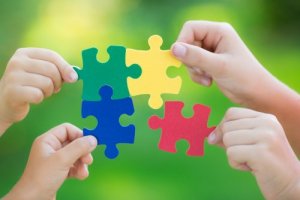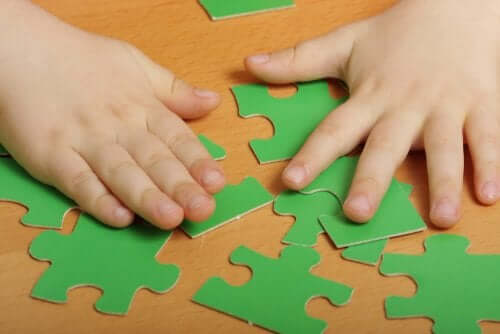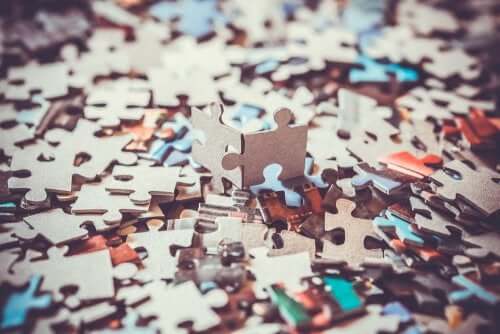5 Psychological Benefits of Puzzles for Kids


Written and verified by the psychologist Ana Couñago
All children in the world like to play, no matter what culture they’re a part of. Because of this, there are lots of games that let children stimulate and enrich their minds, like puzzles. Therefore, in this article, we’ll show you the psychological benefits of puzzles for kids.
First, we need to look at how important play is for kids. Thanks to games, children learn lots of things in a fun and playful way.
“Playing is your brain’s favorite way to learn.”
–Diane Ackerman–
Benefits of puzzles: the importance of play for children
Playing contributes to the cognitive, physical, social and emotional well-being of even the youngest kids. In fact, the American Academy of Pediatrics states that playing is very important to kids’ development. There are a few reasons for this:
- Helps develop a healthy and balanced brain.
- Facilitates interaction with the environment and other people.
- Teaches basic skills and abilities.
- Improves family relationships, when parents and kids play together.
- Promotes acquisition of values and social norms.

All of these reasons show why it’s so important to let kids have time and space to play. In fact, it’s essential for them to grow happy and healthy.
“Children need freedom and time to play. Playing is not a luxury. Playing is a necessity.”
–Kay Renfield Jamieson–
Psychological benefits of puzzles for children
Children can start playing with puzzles from a very young age. In fact, nowadays, there are puzzles for every age on the market.
Doing this activity from just a few years old brings a multitude of physical and psychological benefits. This way, kids develop greater coordination and fine motor skills.
In addition, they also have to develop various cognitive abilities until they complete the activity and put the puzzle together.
5 Psychological benefits of puzzles for children
Develop attention and memory
Puzzles improve children’s ability to concentrate and their memory. This is because they have to pay attention to what the image was like. Then, they have to remember what it looks like to put all of the pieces together.
Therefore, kids observe and explore the world around them while they retain and organize information. In addition, they train and develop attention and memory. Those are so important for kids to learn successfully.
Boost their logical capacity
By playing with puzzles, kids develop logical thinking and ingenuity. That is, they learn how to analyze and solve problems.
In addition, puzzles require logical knowledge to reason, plan and figure things out. This skill is important to master science, technology and math.
Visual and spacial intelligence
Puzzles are games that stimulate visual and spacial intelligence. That is, they learn to visually represent spaces and images. Therefore, children learn how to imagine and rotate three-dimensional objects. Then, they learn to move figures around in their minds.

Reinforce self-esteem
Playing with puzzles involves overcoming a complex challenge. Therefore, when children form the picture from lots of pieces, they feel proud of themselves. This helps them to reinforce their self-esteem by learning that they can achieve the goals they set.
Learn to tolerate frustration
In addition to the psychological benefits of puzzles we’ve mentioned, puzzles also help kids learn how to tolerate being frustrated. Through puzzles, kids will run into problems while they try to finish the puzzle.
Then, they need to overcome the frustration in order to put it together. This way, kids learn to control themselves and think before they act.
Give a child a puzzle and you will give him learning and fun.
All children in the world like to play, no matter what culture they’re a part of. Because of this, there are lots of games that let children stimulate and enrich their minds, like puzzles. Therefore, in this article, we’ll show you the psychological benefits of puzzles for kids.
First, we need to look at how important play is for kids. Thanks to games, children learn lots of things in a fun and playful way.
“Playing is your brain’s favorite way to learn.”
–Diane Ackerman–
Benefits of puzzles: the importance of play for children
Playing contributes to the cognitive, physical, social and emotional well-being of even the youngest kids. In fact, the American Academy of Pediatrics states that playing is very important to kids’ development. There are a few reasons for this:
- Helps develop a healthy and balanced brain.
- Facilitates interaction with the environment and other people.
- Teaches basic skills and abilities.
- Improves family relationships, when parents and kids play together.
- Promotes acquisition of values and social norms.

All of these reasons show why it’s so important to let kids have time and space to play. In fact, it’s essential for them to grow happy and healthy.
“Children need freedom and time to play. Playing is not a luxury. Playing is a necessity.”
–Kay Renfield Jamieson–
Psychological benefits of puzzles for children
Children can start playing with puzzles from a very young age. In fact, nowadays, there are puzzles for every age on the market.
Doing this activity from just a few years old brings a multitude of physical and psychological benefits. This way, kids develop greater coordination and fine motor skills.
In addition, they also have to develop various cognitive abilities until they complete the activity and put the puzzle together.
5 Psychological benefits of puzzles for children
Develop attention and memory
Puzzles improve children’s ability to concentrate and their memory. This is because they have to pay attention to what the image was like. Then, they have to remember what it looks like to put all of the pieces together.
Therefore, kids observe and explore the world around them while they retain and organize information. In addition, they train and develop attention and memory. Those are so important for kids to learn successfully.
Boost their logical capacity
By playing with puzzles, kids develop logical thinking and ingenuity. That is, they learn how to analyze and solve problems.
In addition, puzzles require logical knowledge to reason, plan and figure things out. This skill is important to master science, technology and math.
Visual and spacial intelligence
Puzzles are games that stimulate visual and spacial intelligence. That is, they learn to visually represent spaces and images. Therefore, children learn how to imagine and rotate three-dimensional objects. Then, they learn to move figures around in their minds.

Reinforce self-esteem
Playing with puzzles involves overcoming a complex challenge. Therefore, when children form the picture from lots of pieces, they feel proud of themselves. This helps them to reinforce their self-esteem by learning that they can achieve the goals they set.
Learn to tolerate frustration
In addition to the psychological benefits of puzzles we’ve mentioned, puzzles also help kids learn how to tolerate being frustrated. Through puzzles, kids will run into problems while they try to finish the puzzle.
Then, they need to overcome the frustration in order to put it together. This way, kids learn to control themselves and think before they act.
Give a child a puzzle and you will give him learning and fun.
All cited sources were thoroughly reviewed by our team to ensure their quality, reliability, currency, and validity. The bibliography of this article was considered reliable and of academic or scientific accuracy.
- Antunes, C. (2004). Juegos para estimular las inteligencias múltiples (Vol. 5). Narcea Ediciones.
- Oxfam Intermon. (s.f). ¡A jugar! Juegos con valores para niños y niñas: la importancia del juego en el desarrollo infantil y propuestas de juegos.
This text is provided for informational purposes only and does not replace consultation with a professional. If in doubt, consult your specialist.








